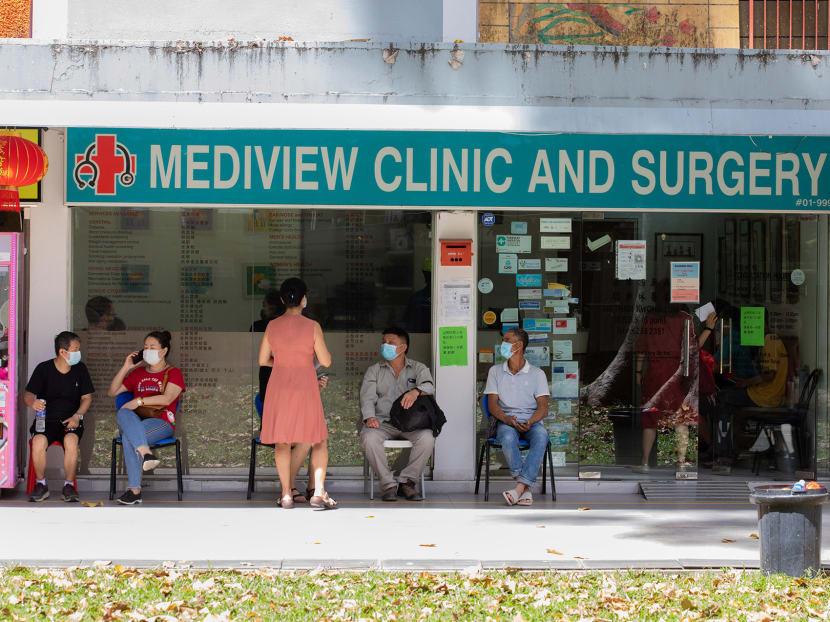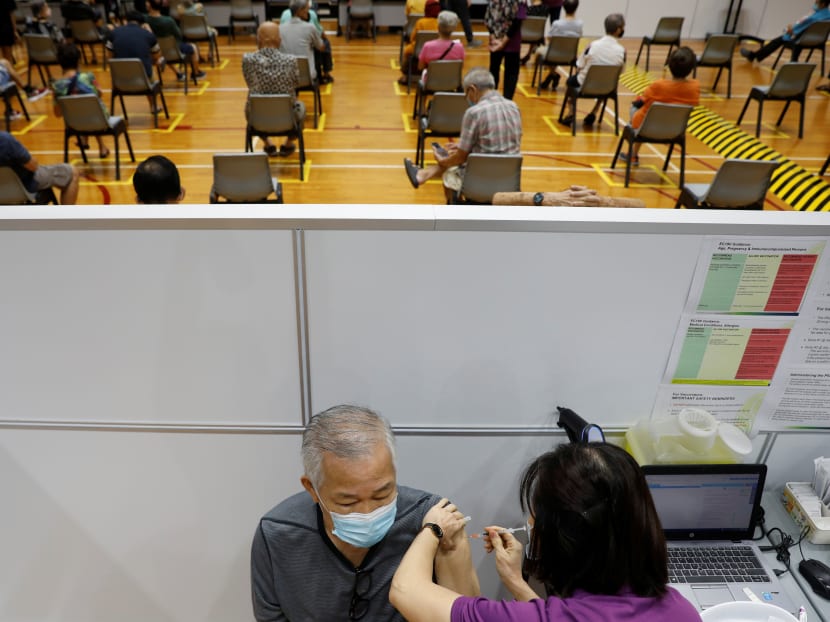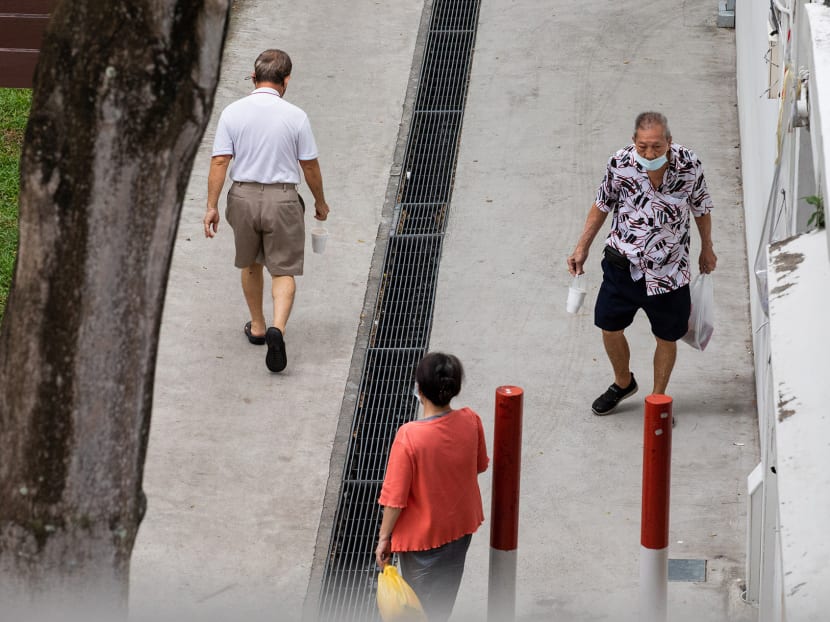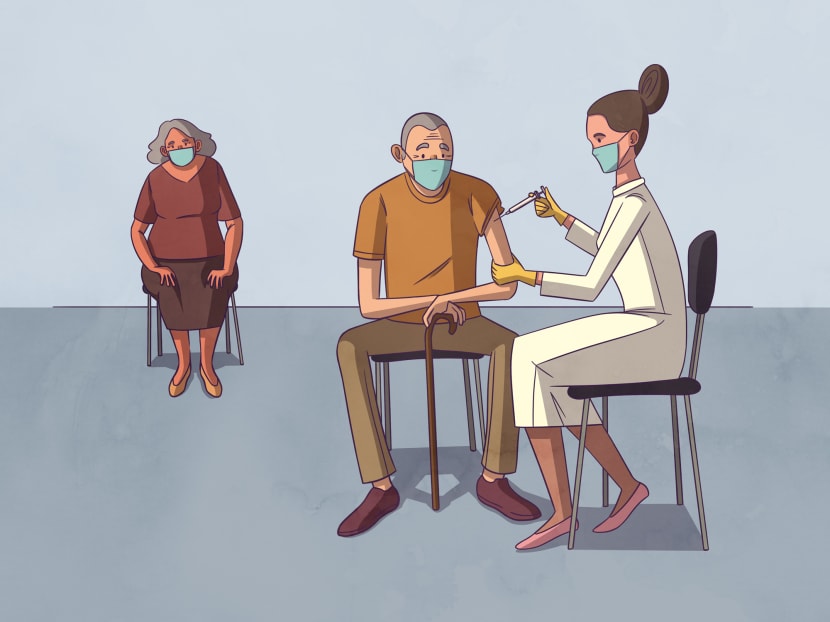The Big Read in short: Not enough seniors are getting Covid-19 jabs, and why this could be a problem
Each week, TODAY's long-running Big Read series delves into the trends and issues that matter. This week, we look at the importance of getting seniors vaccinated against Covid-19 and what's holding them back. This is a shortened version of the full feature.
Each week, TODAY's long-running Big Read series delves into the trends and issues that matter. This week, we look at the importance of getting seniors vaccinated against Covid-19 and what's holding them back. This is a shortened version of the full feature, which can be found here.
- There is a whole gamut of reasons why a sizeable group of seniors in Singapore have not been vaccinated
- These range from fears over the mRNA technology used to develop Covid-19 vaccines, concerns on potential side effects to religious convictions and general lack of awareness
- However, infectious diseases experts say high vaccination rates among seniors is key to keeping the number of deaths low as Singapore heads to a “new normal”
- MPs say they try to engage with elderly residents through dialogue sessions and home visits to encourage them to get jabbed
- While some private companies are offering incentives to vaccinated residents, experts say one way to get more seniors jabbed is to incorporate vaccination into the primary healthcare system
SINGAPORE — Mr Paul Poh’s wife had been urging him to get vaccinated against Covid-19, even dangling the carrot of a safer environment for him to spend time with his grandchildren.
But the 72-year-old retiree would not be rushed; it was only after the authorities allowed some private clinics to administer China’s Sinovac vaccine last month — to overwhelming demand — that he decided to register for his doses. He is now waiting to receive his first jab.
His main reason for not participating in Singapore’s national vaccination programme — which only administers the Pfizer-BioNTech and Moderna shots — is because both vaccines use the messenger ribonucleic acid (mRNA) technology.
This is the first time that the mRNA technology has been approved by the World Health Organization and health authorities around the world for widespread use as vaccines, amid the battle against an unprecedented global health scourge that is Covid-19.
Mr Poh reiterated that his preference for Sinovac stems from the fact that it uses inactivated coronavirus to trigger an immune response — a more traditional vaccine technology that had been used to develop vaccines for other diseases such as polio.
Both the Pfizer-BioNTech and Moderna vaccines have shown efficacy rates of well over 90 per cent against symptomatic disease in clinical trials, compared with Sinovac's 51 per cent.
Singapore’s expert committee on Covid-19 vaccination under the Ministry of Health (MOH) had previously come out to stress that current mRNA Covid-19 vaccines used here continue to be “safe and highly effective”, and “show protection against variants of concern”.
Separately, infectious diseases expert David Lye also said that the vaccines using mRNA technology are the most effective against the coronavirus, including its variants, while there is hardly any data on how the Sinovac vaccine performs against the variants.
Mr Poh is among a sizeable group of seniors aged 60 and above in Singapore who have yet to come onboard the national vaccination programme, which was started about six months ago with seniors as the first group eligible for the jabs. Vaccination is seen as key for a pandemic-weary nation to move to a “new normal”, where social distancing requirements and travel restrictions could be relaxed.
Apart from concerns over the newness of mRNA technology, other factors include fear of the side effects, especially among those who have pre-existing illnesses; a belief that vaccines are not necessary; religious convictions; and also a general lack of awareness of how to get vaccinated, TODAY’s interviews with those aged 60 and above showed.
The Government has set a target of having two thirds of its population fully vaccinated by National Day on Aug 9.
Based on MOH’s latest figures, as of June 28, 76 per cent of seniors aged 60 and above have had at least one dose of the vaccine.
In April, it was revealed in Parliament that at the time, about 60 per cent of eligible seniors aged 70 and above had either been jabbed or booked their vaccination appointments. This was lower than the proportion (70 per cent) of those between 60 and 69 who had done so.
Throughout the pandemic, government leaders including Prime Minister Lee Hsien Loong himself have made impassioned pleas for seniors to get vaccinated. Most recently, the three co-chairs of the multi-ministry Covid-19 task force — Trade and Industry Minister Gan Kim Yong, Finance Minister Lawrence Wong and Health Minister Ong Ye Kung — as well as MOH director of medical services Kenneth Mak all repeated the call last week.
The Government has left no stones unturned in its bid to encourage seniors to get jabbed. For example, it has been deploying doctors and nurses to homes to help those who are homebound or not mobile to receive their jabs. Those aged 60 and above can also walk into any vaccination centre and get vaccinated on the spot, without the need for prior registration.
In recent days, Cabinet Ministers have appeared in online videos with local celebrities and speaking in various vernacular languages about the importance of vaccination.
Infectious diseases specialists told TODAY that vaccination is especially vital for the elderly — who are vulnerable to severe illness from Covid-19 — as it provides them with the needed protection when Covid-19 becomes endemic. This is when people will get used to living with the coronavirus in their midst and where there may be occasional spikes in the infection rates — just like they have learnt to live with dengue and the common cold.

While the Sinovac vaccine offers recipients some form of protection against the Covid-19 virus, it is not part of Singapore's national vaccination regime. The Health Sciences Authority has yet to approve Sinovac because of the lack of some critical data from its manufacturer.
Sinovac is provided here only under the Special Access Route framework. Vaccines under this framework are not covered under the Vaccine Injury Financial Assistance Programme, which supports people who suffer adverse effects from their Covid-19 jabs.
MOH has said that residents who choose Sinovac have to pay for consultation fees and the 7 per cent goods and services tax, but they would not be charged for the vaccine itself, since it is being provided at no cost to these private clinics.
Still, some seniors remain apprehensive of the mRNA technology. “We are being treated like guinea pigs,” said a 63-year-old relief kindergarten teacher, who wanted to be known only as Ms Yap, about her fears in relation to mRNA vaccines.
Mr S Teo, who declined to give his full name, said he also prefers Sinovac as it is made using the same technology as the flu vaccine he takes every year.
“I know you may say there are no side effects now, but maybe in five to 10 years, you don’t know what are the effects that are going to come out,” said the 64-year-old.
Some seniors also told TODAY that they do not want to be vaccinated due to religious convictions.
“If you are so strong in your faith and believe that God is in control, you don’t need that kind of vaccination. That’s my take,” said Mr Simon Wee, a 62-year-old Christian.
Mr Eric Tan, 72, said that he will only take the vaccine if it is made mandatory or if he needs to go overseas.
Mr Tan, who works in the courier service, said while he does not fear contracting Covid-19, he still takes precautions such as wearing a mask and washing his hands when he goes out.
“I will not allow fear to come upon me… and I pray for God’s protection,” he added.
Other seniors told TODAY that they do not believe that it is necessary to be vaccinated against Covid-19 since they rarely leave their homes and do not interact with many people.
Madam Fatmah Hakimdin, 77, who only goes out once a week to buy groceries from the market, said: “I’m mostly at home…I’m not worried about getting Covid-19 and falling sick.”
Mdm Fatmah is also fearful of the possible side effects from taking the vaccine as she had suffered allergic reactions after taking muscle relaxant pills.
For Mr Ang Heng Soon, 70, he does not want to trouble his sons and grandchildren in case he suffers from any side effects from the vaccination, given that he is already beset with health issues.
“My body is deteriorating quite badly. I don’t want to live so long. I’m retired, I just live life peacefully and quietly ... Why should I get jabbed and feel uncomfortable?,” he said in Mandarin.
There are also seniors, such as Madam Teo Ah Eng, who want to be vaccinated but do not know how to go about it.
The 85-year-old told TODAY in Mandarin that she is waiting for her son to take her to the vaccination centre when he is free.
“I think it’s important but I don’t dare to go myself. I don’t know the direction, and I don’t know how to get back,” said Mdm Teo, who was not even aware that the vaccine has to be taken in two doses.
EFFORTS TO GET SENIORS VACCINATED
Several Members of Parliament (MP) said that they, along with grassroot activists and volunteers from the Silver Generation Office, have conducted home visits to correct misconceptions the elderly may have about getting vaccinated.
Mr Wan Rizal, MP for Jalan Besar Group Representation Constituency (GRC), said that he would approach each elderly person differently based on the reasons why they do not want to be vaccinated.
For those who have been misinformed, he said it is important to prepare facts beforehand.
“For example, last year there was talk that in a particular foreign country the residents in the old folks’ home died after vaccination. So we had to show them the proof that it wasn't so,” he said.
Ms Joan Pereira, MP for Tanjong Pagar GRC, said that she and her team would try to allay the senior citizens’ fears and suspicions about the vaccine by explaining to them using simple terms in the language or dialect that they understand.
MPs have also held various forums and dialogues, both in-person and online, with a medical doctor to explain how mRNA vaccines work.
Workers’ Party’s Hougang MP Dennis Tan said a small number of his residents who are above 60 had told him that they could not take the jabs due to their medical conditions.
“A few wanted to wait for the Sinovac vaccination. MOH should continue to reach out to those who still do not understand why Sinovac is not available generally in the same manner as (the Pfizer and Moderna vaccines) are,” he said. “It would be desirable if everyone understands the correct rationale for vaccination and chooses to vaccinate for the right reasons.”

WHY SENIORS NEED TO BE VACCINATED
While the concerns and fears that the elderly have about Covid-19 vaccines are valid, it is of paramount importance that they are persuaded to get vaccinated as soon as possible, infectious disease specialists told TODAY.
Professor Leo Yee Sin, executive director of the National Centre for Infectious Diseases, pointed out that over a third (35.5 per cent) of Covid-19 cases during the recent surge between June 12 and 24 involved those aged 60 and above.
While she said that there is no set target for the vaccination rate of the elderly, Singapore should aim to have as many people vaccinated as it reduces the risk of infection and severe illness, helps to protect others and reduces the viral load in the community.
If vaccine coverage for the oldest age groups can go up from 60 per cent to 90 per cent, the number of deaths due to Covid-19 can be reduced by 75 per cent, said Associate Professor Alex Cook, vice-dean of research from the Saw Swee Hock School of Public Health at the National University of Singapore (NUS).
“Once Covid-19 becomes endemic, it will be circulating at levels higher than Singaporeans have become accustomed to over the last year, and the key modifiable determinant in how many deaths occur will be how many of our elders have been vaccinated,” he said.
About a week ago, the three co-chairs of the multi-ministry Covid-19 task force wrote in an opinion piece published in the newspapers that the coronavirus may never go away and will likely become endemic.
The “new normal” would refer to a situation where Singapore would register a few Covid-19 infections every now and then but with the elderly and vulnerable protected, said Associate Professor Paul Tambyah, President of the Asia Pacific Society of Clinical Microbiology and Infection.
If not enough seniors are being vaccinated, Assoc Prof Cook said that there is a “substantial risk” that Singapore would not be able to reach herd immunity through vaccination.
DOING MORE TO NUDGE SENIORS
Private companies such as ride-hailing firm Gojek and eatery chain Shake Shack have started to offer their own incentives to boost vaccination rates in Singapore.
While some MPs applaud these efforts by the private sector and view them as fulfilling their corporate social responsibility, most are cautious about such an approach if it were to be taken up by the public sector.
Some felt that it would be unfair to residents who got vaccinated earlier and it may create expectations that future government programmes would also offer incentives. Others believe that such inducements may not be enough to persuade seniors who have strong convictions that the vaccine is not safe for them.

Infectious disease experts said that an important step is to incorporate vaccination in Singapore’s primary healthcare system, which refers to the general practitioner (GP) clinics and polyclinics which most Singaporeans go to as part of their routine medical care.
Based on his team’s research on promoting influenza vaccines before the pandemic, Assoc Prof Cook said that the most effective way to encourage vaccination is for doctors at GP clinics or polyclinics check on the vaccination status of seniors when they consult them, and offer their unvaccinated patients a jab on the spot.
By offering vaccination through primary care, Assoc Prof Tambyah said this would integrate vaccination into routine care and would not involve complicated electronic booking systems, which can be a challenge for many seniors.
Ms Ng Ling Ling, deputy chairperson for the Government Parliamentary Committee for Health, said that such an approach has merit as primary care family doctors are often the first line of medical advice that seniors seek out.
However, Ms Ng, who is also an MP for Ang Mo Kio GRC, said there may be practical and operational constraints, especially for smaller standalone GP clinics to administer the vaccination.
MPs also stressed the importance of having friends and family members in encouraging their elderly loved ones to get vaccinated.
While there is a lot of scientific information available and one can go into the technical details of how mRNA vaccines work, MacPherson MP Tin Pei Ling said the personal touch is the most important.
“Knowing that their friends or friends who may have similar symptoms or conditions themselves went through (the vaccination process) and are okay, I think these would all be helpful.
“The fear always comes from ‘what if’ or ‘I don’t know enough, this is so new’... But when they see that their peers are okay, that would be more encouraging,” Ms Tin said.









